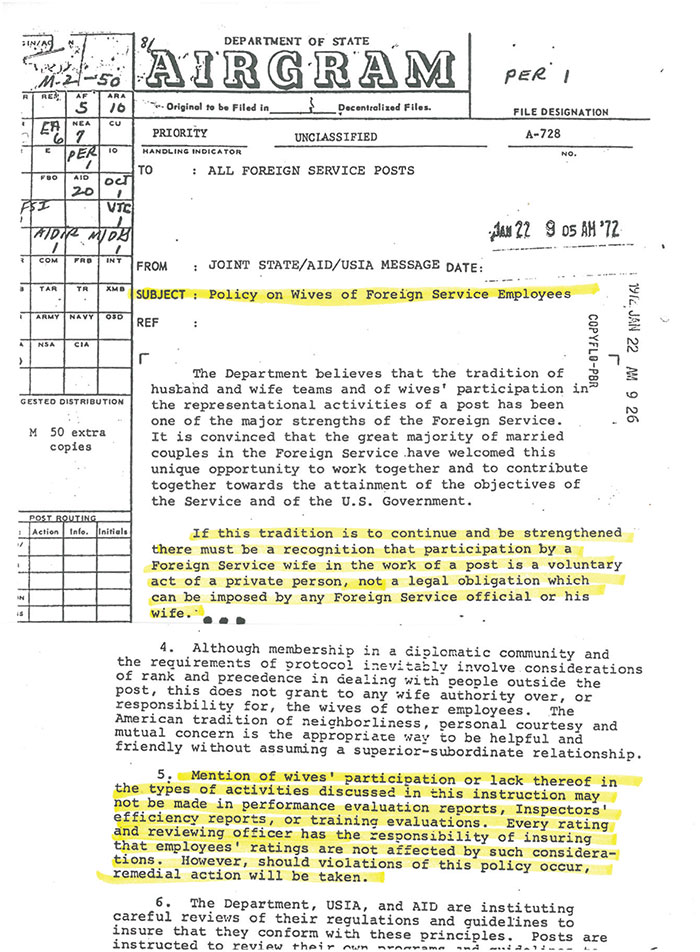Challenging Tradition
Female members of the Foreign Service of the 1950s through the 1990s break through barriers at the Department of State.
This selection of excerpts from the oral histories of three retired female Foreign Service officers—Elinor Constable, Phyllis Oakley and Mary Olmsted—brings to life the atmosphere of the Foreign Service in the second half of the 20th century. These are but a few voices from that era, but they convey the spirit and determination of the generation that witnessed and helped open the way for women in the career Foreign Service.
We are indebted to the oral history collection developed and maintained by the Association for Diplomatic Studies and Training (www.adst.org).
—The Editors
‘Show Me the Law…!’
ELINOR CONSTABLE

Until the 1970s, the evaluations for male FSOs included an assessment of their wives’ involvement in representational activities and general comportment. On Jan. 22, 1972, in response to growing protest, the Department of State sent an airgram clarifying that participation by a Foreign Service spouse in the work of a post is a voluntary act and “not a legal obligation which can be imposed by any Foreign Service official or his wife.”
I had no particular career ambitions. My idea was to work at something that was interesting and fun. I didn’t want to be a secretary. That was the other thing women were supposed to be [in the 1950s]. … And the notion that this was what every woman was destined to be, was nuts. I passed the written exam with flying colors. … I would describe the process as extremely patronizing, particularly towards a woman, and subjective. …
A month or so before we were married [her fiancé was also in the Foreign Service], I was summoned to the executive director’s office in the Economic Bureau. The executive director in those days was a legendary figure by the name of Frances Wilson. We were all terrified of Frances, but she congratulated me on my engagement, and I was touched. My goodness, how nice.
And then she said, “When do you plan to resign, Miss Greer?”
And I said, “I don’t plan to resign.” … No woman had ever done this in the history of the Foreign Service. I said, “You can’t force me to resign. If you want me out, you have to fire me.”
She said, “Miss Greer, you are required to resign.”
I said, “Show me the regulation. Show me the law. Where is it?”
Well, there wasn’t one. This came as a shock. I was quite prepared for her to pull out a book, and show me some regulation, and at that point I would fight it as far as I could.
There was none! It was custom, plain old custom, buttressed by two practical limitations. One, you did not have to grant maternity leave to women in those days. … And second, there was a restriction on the books about family members working together at the same post. But we were in Washington, and I said, “This makes no sense. I am not going to be a different person after I am married. Nothing is going to change. And I am going to continue to do this job.”
We started our family right away and there was no such thing as maternity leave, so at that point I did resign. …
[Some years later, in 1973], we returned to D.C. and I went back to work. … Peter came home with a pink copy of a message describing the new policy about women in the Foreign Service, inviting women who had been forced out to reapply. …
When I rejoined the Foreign Service, I had been in the Civil Service at the GS-13 level, which in those days translated to FS-4. I was brought back as an FSR-5, and I complained about it. Not because I expected a 4, but because I’m not a doormat. I wrote a memo to the director of personnel and said, “I don’t think it’s appropriate; I should be a 4.”
He was furious, and was reliably quoted as saying ‘If she didn’t want the 5, why the hell did she come back in?’ ...
The first thing I did when I came back was sit on the files project. And one of the things I did on the files project was check the files of anyone who had come in laterally. And guess what? The men came in at 4 if they had been a GS-13, and I came in as a 5. …
When the women sued the State Department back in the mid-70s—this is a hard story for me to tell, but let’s be truthful for history. I don’t believe in suing the State Department. I didn’t like the style of the people who were in charge of the suit. … There is a statistical pattern of discrimination which is, I think, clear and well established. And I think, by and large, it is not just unconscious, but maybe even subconscious. And we need to work on it. But I don’t like the suits.
My husband urged me to join it. … As a whole the department was doing what was comfortable. It was because these women had taken risks. You shouldn’t just leave them out there to take all the flak. It was a class action suit which was filed by female Foreign Service officers led by Alison Palmer and others. The claim in the suit was that the department had discriminated against women in hiring, assigning, promoting, giving incentive awards, every step of the way. ...
I was promoted as fast as anybody in the Foreign Service. I became an ambassador, I became an assistant secretary. I was the first woman to be a principal deputy assistant secretary in EB. I was the first woman to run the international finance and development portfolio in the EB. So for me to argue that the department was discriminating against me as an individual was ridiculous. … [Constable did join the suit, but was not eligible for the remedies the department was ultimately required to offer.]
It Was the Early 1970s, and America Was Changing
PHYLLIS OAKLEY
We had decided to get married [in 1957], and it was a very complicated situation. I knew that I had to resign. I must say that at the time my consciousness was very low. Women in the Foreign Service knew that if they married they would have to resign, and we accepted that discrimination without batting an eyelash.
At the time, there weren’t many vacancies for junior officers; if the department had offered me something potentially interesting and challenging, I might have felt differently about resignation. My decision to get married was undoubtedly greeted by the Personnel Office with relief because it was just one less person it had to place. …
I never asked to see the regulations about married women; I did not object or demand a job when I got to Khartoum. I just accepted life as it was generally lived. In fact, the department operated by custom, and not because of legal limitations; but no woman thought of challenging those customs—our consciousness was very low indeed. … I was deeply in love, ready for marriage. I did not see myself as a victim in marrying Bob; it was the beginning of a new phase in my life.
Sometime during our tour in Beirut [1974], we began to hear that the State Department was changing in regard to women. The issue of married women in the Foreign Service had been revisited, and policies were changing—for example, women were no longer required to resign when they married. So I went to see the embassy’s personnel officer and told her that in light of the policy changes being implemented and in the likely event of a next assignment to Washington, D.C., I would want to apply for a return to the Foreign Service. …
Officials were striving to advance women and to demonstrate that they were moving with the times.
—Phyllis Oakley
At this point, I felt I could do it—our daughter was going to enter high school and our son was going into junior high, and we would probably be in Washington for a while. So the timing for reentry was quite propitious, and soon after our return to Washington, I “came back in.”
I should say one other thing about my decision. I have never denigrated the role of women in the Foreign Service; I was “wife of” for 16 years and know how difficult it is to manage a family under very trying circumstances and many moves. The management of children and a household and the required social life was a full-time job. … So I didn’t reenter the workforce because I looked down on the role of a Foreign Service wife. …
It was the early 1970s, and America was changing. There was a sexual revolution, a feminist revolution and a political revolution—thanks to Vietnam. Even the State Department changed. I found it a great advantage to be a woman at that time. Officials were striving to advance women and to demonstrate that they were moving with the times. I became the first female staff assistant on the seventh floor, where the highest-level State officials work. I was the first spouse permitted to work in her husband’s embassy (in Kinshasa), and the first spokeswoman in the State Department. It was a rewarding path—providing both time for my children when they were young and a fulfilling career.
I hope young officers starting careers today will remember that most of the changes for women at the State Department would not have come about without lawsuits and a fair amount of pushing. And both men and women in the Foreign Service today should know that the tension between career and parenthood still exists, especially for women.
Would I recommend the Foreign Service career to young women today? You bet I would. In spite of the danger, sharp shards left in the breached glass ceiling and complexities of family life, I still see the Foreign Service as the most interesting and worthwhile career in the world.
A Female Ambassador: What Could This Mean?
MARY OLMSTED
I had been in Washington for a long time and I was looking for an onward assignment and was getting nowhere with it when one day [in 1974] there crossed my desk a big fat memorandum asking for permission to open a new post in Port Moresby, Papua New Guinea. As I thumbed through the memo I thought to myself, “I wonder what poor devil we will send to the jungles of New Guinea?” But somehow it stuck in my mind. … I began to think, “Wouldn’t it be fun to open up a new post?”
So I wrote a memorandum to the Director General and sent copies of it to the director of personnel, the head of assignments, and everybody else I could think of, and said I would like to be considered to open the post, which would open as a consulate general in Port Moresby, Papua New Guinea. Well, dead silence ensued. And several days later the Director General came into my office with my memo in hand, and he said, “You really mean this?” And I said, “Yes, I do.”
The government of Papua New Guinea, the people who were running the country were very puzzled when the United States sent a woman there as their first representative; they didn’t know how to take it.
—Mary Olmsted
So indeed he delivered. There was some protest from the desk level in the geographic bureau, but I weathered that storm. The desk thought it was nonsense to send a woman to Papua New Guinea. … That point was made very clear, and in writing, and when I got that memo I had to laugh a little bit. I said they won’t dare cancel this assignment now that there is written evidence that cancellation would be on the basis of discrimination. …
I learned considerably later, toward the end of my tour there, that the government of Papua New Guinea, the people who were running the country, were very puzzled when the United States sent a woman there as their first representative, and they didn’t know how to take it until the United States named Anne Armstrong as ambassador to the United Kingdom. They read about that in Time magazine, and they thought, “Well, the United States sent a woman to London, and they sent one to Port Moresby.” And they felt that kind of put them in the same league as the United Kingdom, and they felt very pleased.
Then they began to say, “We, too, should have women who are able to take high positions in our government. We should train them and bring them along and give them appointments.” And I think my appointment there had something to do with improving the status of women in Papua New Guinea. Their ambassador here [in 2004] was a woman.
Read More...
- The Palmer Case and the Changing Role of Women in the Foreign Service (The Association for Diplomatic Studies and Training)
- Cracking the Glass Ceiling: A Conversation with Foreign Service Women (The Association for Diplomatic Studies and Training)
- Starting an Embassy from Scratch in Papua New Guinea, Interview with Mary Olmsted (The Association for Diplomatic Studies and Training)
- From ‘Wife of’ to Assistant Secretary of State, Interview with Phyllis Oakley (The Association for Diplomatic Studies and Training)
- ’If you want me out of the Foreign Service, you have to fire me,’ Interview with Elinor Constable (The Association for Diplomatic Studies and Training)




